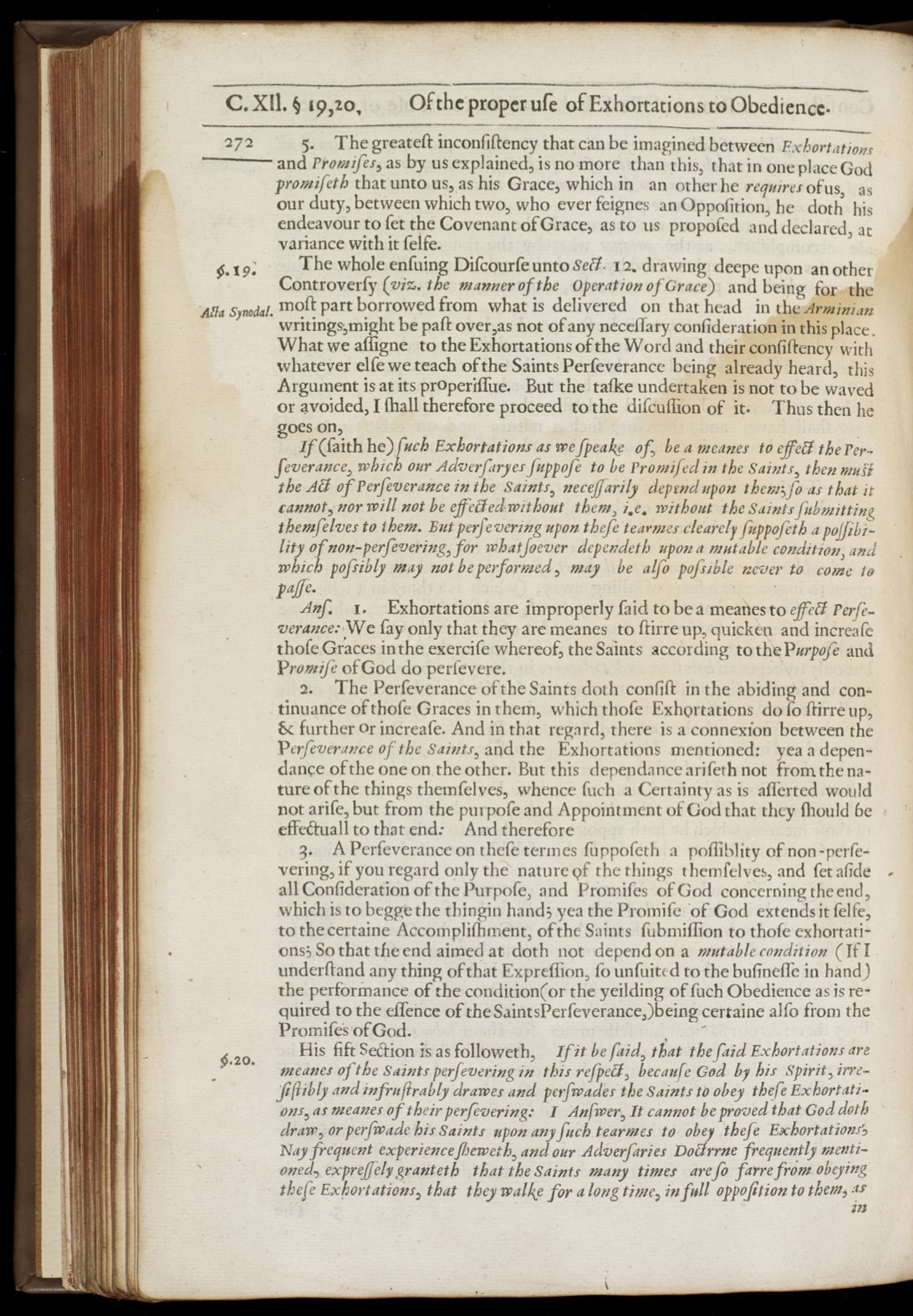

C.
XII.
g
í9,2o,
Of
the
proper
ufe
of
Exhortations to
Obedience
272
5.
The
greateft incontinency
that,can
be imagined between
Exhortations
and
Promifes,
as
by us
explained,
is
no more than this
that
in
one place
God
promifeth
that unto
us,
as
his
Grace, which
in an
other
he
requires
ofus,
as
our duty, between
which
two,
who ever
feignes an
Oppofition, he doth
his
endeavour
to
fet
the
Covenant
of
Grace,
as
to
us
propofed and declared, at
variance with it
felfe.
4
9;
The
whole enfuing Difcourfe
unto
Seat.
r2.
drawing
deepe upon
an
other
Controverfy
(viz.
the
manner
ofthe
Operation
of
Grace)
and
being for
the
Arta
synodal.
moft
part
borrowed from what
is
delivered on that head
in
the
Arminian
writings,might be
pact
over,as
not
of
any neceffaryconfideration in this place.
What
we affigne
to
the Exhortations
of
the Word
and
their
continency
with
whatever elfewe
teach
of
the
Saints
Perfeverance being already heard,
this
Argument
is
at
its properiffue.
But
the talke undertaken
is
not
to
be
waved
or
avoided, I
{hall
therefore proceed
to
the
difcuflion
of
it.
Thus
then
he
goes
on,
if
(faith he)
filch
Exhortations
at
we
fpeake of,
be
a meaner to
effect
the
Per
-
f
everance, which our
Adverfaryes
fuppofe to
be
Promifed
in
the
Saints,
then
the
AEI
of
Perfeverance
in
the
Saints,
neceffarily depend upon
them;
fo
as
that it
cannot; nor will
not
be effeffecl
without them,
i.e.
without the Saints fukmitting
themfelves
to
Them.
But
perfevering
upon
thefe tearmes
clearely fuppofeth a po
/bi-
lity
o
f
non-
perfevering,
for
what,
foever dependeth
upon
a
mutable condition,
and
which
pofribly may
not
be
performed,
may
be
alfo pofsible
never
to come
to
pale.
Anf. a.
Exhortations are improperly
Paid
to
be
a
meanes
to
lea
Perfe-
verance:
We
fay
only
that
they are
meanes
to
ftirre up, quicken and
increafe
thofe
Graces
in
the
exercife whereof,
the
Sàints
according
to
Purpofe
and
Promife
of
God do perfevere.
2.
The
Perfeverance
of
the
Saints
doth
confift
in
the
abiding and
con-
tinuance
of
thofe Graces
in
them,
which
thofe Exhortations do
fo
ftirre
up,
bz
further or
increafe.
And
in
that
regard,
there
is
a
connexion between the
Perfeverance
of
the
Saints, and the
Exhortations mentioned: yea
a
depen-
dance
ofthe
one on the other.
But
this dependance
arifeth not
fromthe
na-
ture of
the
things themfelves, whence
fuch
a
Certainty
as
is
afferted would
not
arife,
but
from the purpofe and Appointment
of
God
that
they
fhould be
effeetuall
to that end:
And therefore
3. A
Perfeverance
on
thefe term
es
fuppofeth
a
poffiblity
of
non-
perfe-
vermg,
if
you
regard
only
the
nature
of
the things themfelves,
and fet
elide
all Confideration
of
the Purpofe, and Prom
ifes
of
God concerning
the
end,
which
is
to
begge
the thingin hand;
yea
the
Promife Of God
extends it
felfe,
to
the certaine
Accomplifhment,
of
the Saints
fubmif
lion
to thofe
exhortati-
ons;
So
that the
end
aimed
at
doth not depend
on
a mutable
condition
(If
I
underftand
any
thing
of
that
Exprefíion,
fo
unfuited
to the
bufineffe in
hand)
the performance
of
the condition(or the
yeilding
of
filch
Obedience
as is
re-
quired to the
effence
of
the
SaintsPerfeverance,)being certaine allo
from
the
Promifes
of
God.
20
.
His fift Seelion
is as
followeth,
Ifit
be
Paid,
that
the
faid
Exhortations
are
meanes
of
the Saints
perfevering
in this
refpecl, becaufe God
by
his
Spirit, irre-
f
(libly
and
infra
firably drawer
and
perfwades the
Saints
to obey
thefe
Exhortati-
on,,
as meaner
of
their
perfevering:
I
Anfwer,
It
cannot
be
proved
that
God doth
draw,
orperfwade
his Saints
upon any
filch tearmes
to
obey
thefe
E.xhortations'',
Nay
frequent
experience
fheweth,
and
our Adverfaries
Dotlrrne
frequently menti-
oned,
exprefelygranteth
that
the
Saints
many times are
fo
fore
from
obeying
thefe
Exhortations,
that
they
wall
e
for
a longtime, in
full
oppofition
to
them,
as
in










